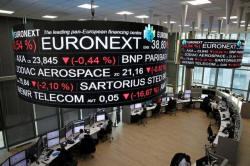|
Political pressures start
to show through on French stock market
 Send a link to a friend
Send a link to a friend
 [February 03, 2017]
By Sudip Kar-Gupta [February 03, 2017]
By Sudip Kar-Gupta
PARIS
(Reuters) - Growing uncertainty over this year's French presidential
election is starting to have an impact in terms of how risky the
country's stock market is perceived by investors.
The jitters have not only begun to play on nerves in the French bond
market but are also creeping through to French stocks, as measured by
the country's equity risk premium (ERP).
The ERP is the extra return investors expect from a combination of
dividend yields and earnings-driven stock price projections, compared
with yields on low-risk government bonds minus inflation.
While a relatively elevated ERP reading can signify that a market may
offer higher returns than others, it can also indicate that investors
are more wary of investing in that market compared to others.
France's ERP has risen steadily in January, as previous forecasts of
victory for the business-friendly, conservative candidate Francois
Fillon have been hit by allegations that his wife was paid for work she
may not have done. Fillon has denied any wrongdoing.
The reading dropped down in November and December, when Fillon was
regularly coming out on top in the polls. However, it has then climbed
back up at the start of 2017 to just shy of seven percent.

Investors also fear the possibility of a win for Marine Le Pen, leader
of the far-right National Front (FN), with French borrowing costs rising
this week.
"It reflects the increasing polarization of the election, namely the
growing political and event risk," said Phoebus Theologites, co-founder
of multi-investment company SteppenWolf Capital.
"Not only has a far-left candidate won the primary for the Left despite
wide expectations of a more moderate candidate coming through, but the
far-right candidate has announced that she will table a bill for France
to leave the euro, if elected," he added.
[to top of second column] |

Company stock price information is displayed on screens as they hang
above the Paris stock exchange, operated by Euronext NV, in La
Defense business district in Paris, France, December 14, 2016.
REUTERS/Benoit Tessier

Fillon
is under pressure to withdraw his candidacy, while left-wing Socialist candidate
Benoit Hamon and Le Pen have started to gain more ground in the polls -
unsettling investors.
France's CAC-40 equity index has also underperformed at the start of 2017, even
though many of its blue-chip companies do much of their business outside France,
and would therefore be insulated to an extent from Parisian politics.
The CAC is down around 1 percent so far in 2017, compared to a 0.3 percent rise
on the pan-European STOXX 600 index.
"The likely withdrawal of Mr Fillon from the presidential race not only
eliminates a pragmatic pro-business candidate but also puts the whole
traditional right in disarray and thus in a dismal position to face the
election," said Roberto Magnatantini, head of global equities at SYZ Asset
Management.
"The most obvious beneficiaries are the candidates and parties that vocally
contest the status quo, led by Marine Le Pen. Their economic agendas are
worrying enough to probably explain an increase in France's risk premium."
(Editing by Leigh Thomas; Editing by Tom Heneghan)
[© 2017 Thomson Reuters. All rights
reserved.] Copyright 2017 Reuters. All rights reserved. This material may not be published,
broadcast, rewritten or redistributed.
 |